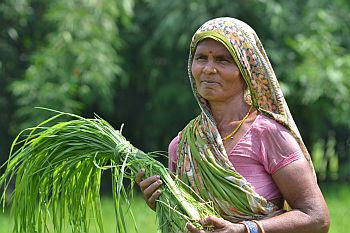One of the biggest challenges policy-makers face when dealing with climate change adaptation and mitigation is the uncertainty of predictions. This often leads them to ask climate scientists for more reliable forecasts, rather than starting to act. But even though knowledge and climate models will improve, there will always remain a pinch of uncertainty. Yet immediate actions are needed to tackle climate change.
Here “no-regrets” interventions are coming into play; measures that bring benefits even in the absence of climate change. In many cases, the implementation of these actions establishes a very efficient first step in a long-term adaptation.
A framework for regret-free planning

While the recent climate talks in Bonn rather sidelined agriculture, a study published recently by the CGIAR Research Program on Climate Change, Agriculture and Food Security (CCAFS), including contributions from International Water Management Institute (IWMI) researchers, outlines a path for adapting agriculture to a changing climate despite uncertainties about what growing conditions will look like decades from now.
The researchers developed a framework for prioritizing adaptation approaches at a range of timeframes. This gives decision-makers the possibility to sift through different gradients of scientific uncertainty to understand where there is a general degree of consensus and then move from there to take action. The study further identified examples from developing countries that show how some countries are already working on adaptation strategies that will help them prepare for shifts in growing conditions.
“Climate projections will always have a degree of uncertainty, but we need to stop using uncertainty as a rationale for inaction,” said Sonja Vermeulen, head of research at CCAFS and the lead author of the study. “Even when our knowledge is incomplete, we often have robust grounds for choosing best-bet adaptation actions and pathways, by building pragmatically on current capacities in agriculture and environmental management, and using projections to add detail and to test promising options against a range of scenarios.”
Great examples from the developing world
In Sri Lanka, where near-term projections for temperature and precipitation are rather contradictory, the government, with input from IWMI studies, worked with multiple stakeholders including farmers to identify a range of adaptive measures for agriculture. The sector accounts for one-third of employment in the country. One of the measures that were identified came from the ancient Sri Lankan kingdoms, where large above-ground tanks were used to collect and store rainwater for use in drier times. In recent years, however, many tanks had fallen into disuse. Policy initiatives are helping to revive the tank system in the hope that improved water storage will benefit communities whatever the outcome of climate change.
Another county that is struggling with contradictory climate projections is Nicaragua. However here scientists were able to show that all climate scenarios agree in one point: the climate nice for the popular Arabica coffee bean will be significantly affected. Based on the knowledge policy-makers urged farmers to introduce new shade-grown coffee varieties or cocoa, a crop with a similar cash value and suitable for future conditions.
“Some farmers and countries are going to need to make big transitions in what food they produce”, concluded Vermeulen. “Science is now reaching a point where it will be able to provide advice on when—not just whether—major climatic shifts relevant to agriculture will happen. Helping governments and farmers plan ahead will make all the difference in avoiding the food insecurity and suffering that climate change threatens.”
[hr top=”no”/]

